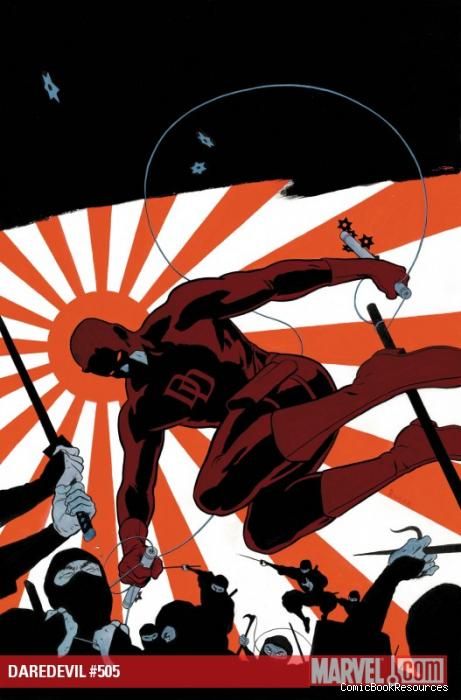Roberto De La Torre was the main draw over the past few issues, at least for me. His "Daredevil" was gritty and evocative, and he was a superb choice to follow the lengthy runs of Alex Maleev and Michael Lark. But he's gone now, at least for a little while, and while his departure from the also gritty and evocative "Thunderbolts" was followed by the completely wrong choice of Bong Dazo, he's followed on this series by Marco Checchetto, who you may remember from the quickly-cancelled Howard Chaykin take on the "Squadron Supreme" and the not-all-that-impressive "American Son" arc in "Amazing Spider-Man."
Checchetto, inking himself here, proves a fine successor to De La Torre. He's not quite as good, but he's able to give Matt Murdock's trip to Japan a scratchy, scrappy look. Though Daredevil only pops into his costume for the final few pages, Checchetto is able to handle the superhero action as well as the angry-guys-in-suits stuff.
New co-writer Anthony Johnston makes his debut here, as well, after producing critically-acclaimed work on his creator-owned "Wasteland," and joining Andy Diggle at the end of the "Dark Reign: Hawkeye" series as scripter. Johnston is apparently the co-plotter and co-scripter, and I haven't read enough of his work to detect his contributions to this issue, but no matter who deserves the credit, this is a solidly written superhero comic.
It's nice to see Daredevil get out of Hell's Kitchen, honestly. After the increasingly insular Bendis run and the barely-more-expansive Brubaker issues, Daredevil's world seemed to be the size of a city block. Here, he gets out of the city to meet with the other leaders of the Hand, since he's now the leader of the American wing of the organization. Diggle and Johnston use that plot development to amplify the potential for ninja action (always a plus in a Daredevil comic), but also to show Matt Murdock's increasingly unstable control over his own life. For the past half-decade (less in comics time) Daredevil has taken active control over the crime in his corner of the world. He has seized power to prevent criminals from doing so.
It's led him to become a leader in the most ruthless assassin organization in the world -- hardly a typical position for a costumed superhero to be in, especially when he's not pretending, when he's not infiltrating. No, here he is, directly addressing the other members of the Hand leadership, trying to figure out how he can use his power to his advantage, and to the advantage of the people he wants to protect.
This is a stranger, less realistic direction than we have seen in "Daredevil" for years, but it's in keeping with his pulpy roots and the crime-meets-kung-fu direction Frank Miller made famous in the 1980s. I know I'm enjoying it.

